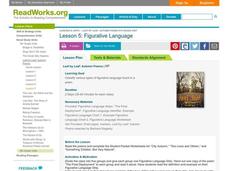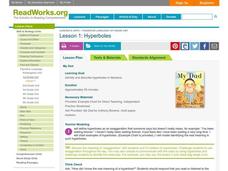Read Works
Figurative Language
Do your learners need to practice identifying figurative language? This lesson outlines a method for working on that tricky skill. After teacher modeling and think-aloud, fourth and fifth graders identify examples of figurative language...
Curated OER
Figurative Language
Fifth graders identify and categorize figurative language in poetry.They read a poem and find an example of figurative language, then read the included hand-out on figurative language, and describe each type of figurative language. They...
Curated OER
Lesson 1: Figurative Language
The story Once in a Blue Moon by Nicola Morgan is full of figurative language. Second graders choose one idiom from the story and create an illustration of its meaning. Handouts and structured vocabulary practice is included...
Curated OER
Metaphors
Students identify metaphors. In this figurative language lesson plan, students learn about metaphors and listen to various examples. Students read a story and identify the metaphors present. Students complete a...
Curated OER
Lesson 3: Idioms
You're as cute as a bug. But are you really as cute as a bug? Bugs aren't cute! Idioms are fun nonliteral phrases that mean something different than the words they contain. Second graders learn about idioms as they read the book, More...
Curated OER
Personification
Second graders recognize personification in texts. In this personification lesson, 2nd graders discuss figurative language and how characters can be given human-like qualities. Students read a story and write down examples they...
Curated OER
Genre Lesson: Poetry
Hook kids into a study on poetry elements by asking them to bring in the lyrics to their favorite song. Discuss the elements in one or two songs (preferably that demonstrate rhyme, figurative language, or a repeating phrase). Groups do...
Read Works
Spring
Celebrate the season of spring with a poem. After reading a four-stanza poem about the season, sixth grade readers respond to 10 reading comprehension questions that have them thinking about the purpose, imagery, and other types of...
Curated OER
Poetic Word Choice
Groups or pairs choose ordinary objects from a bag and rename them based on traits, so that a stapler becomes a "paper cobra." Then they connect this exercise to the way authors use language to emphasize certain traits through word...
Curated OER
Onomatopoeia
Young scholars identify onomatopoeia by identifying sound words in a book and drawing the animals that make those sounds. In this onomatopoeia lesson plan, students read the words as if they were the animal indicated.
Curated OER
Identifying Missing Words
How do you figure out the meaning of a word you don't know? Young readers develop skills to identifying missing words in a story using context clues. Picture clues are used to identify covered words in the story I Can’t Get My Turtle to...
Curated OER
Poetry
What is the difference between a simile and a metaphor? Third graders read a poem as a class and chart all of the similes and metaphors they hear. They then discuss the differences between each literary device as well as what is being...
Curated OER
Similes
A simile is a non literal phrase that needs to be deciphered for contextual meaning. Similes are also fun to read and write. Third graders get cozy with similes found in the book If You Hopped Like a Frog by David M....
Curated OER
Lesson 3: Puns
Encourage more pun-derstanding of word play in your literary scholars as they explore Brian P. Cleary's book Rhyme and Punishment: Adventures in Wordplay. Although this isn't suggested, consider beginning this study by simply showing...
Curated OER
Lesson 1: Determine the Meaning of Unknown Words
Sixth graders use context clues to find the meaning of new vocabulary. In this vocabulary lesson, 6th graders read A Wrinkle in Time written by Madeleine L’Engle and use post its to flag words they don't know. They figure out the meaning...
Curated OER
Hyperboles
Want to see the best lesson is the entire universe? Who doesn't love to exaggerate now and then? Get your class cozy with hyperbole as you read the story My Dad by Anthony Browne. During the reading you'll chart and analyze the...
Curated OER
Lesson 5: Red Herrings
A red herring isn't just a fish! Identify the clues that an author makes in a book to mislead the reader and make predictions accordingly. Have your class discuss how it feels to be tricked as a reader and about making wrong predictions....
Other popular searches
- Figurative Language Poetry
- Figurative Language in Poems
- Figurative Language Quiz
- Figurative Language Project
- Imagery Figurative Language
- Figurative Language Lessons
- Using Figurative Language
- Figurative Language Worksheets
- Figurative Language Test
- Figurative Language in Poetry
- Figurative Language Vocabulary
- Figurative Language in Prose
















